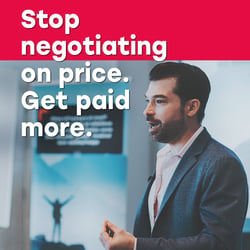Sales Psychology Strategies: 5 Guilt-Free Tactics to Close the Sale
There is not a single sales professional out there who has never felt at least some sense of guilt about using psychological strategies when making a sales pitch.
The reason?
It is easy for sales reps to feel as if they are manipulating the buying decision of their potential buyer. They feel like they are immorally taking advantage of or coercing the prospect when trying to close the sale.
In some instances, sales reps do take advantage of sales psychology to close a sale. As a result, the new customer walks away with the product or service, but they feel manipulated. Do I see a negative customer review coming?
However, sales professionals can use sales psychology to close a sale AND still give the customer their best buying experience ever.
In the end, the way you make the customer feel will determine whether or not you make the sale. Use psychological tactics to make them feel better!
Moreover, when done correctly, you can use sales psychological principles to close more sales and feel good about using them to help the new customers find solutions!
Here is how you and your sales team can integrate sales psychology into your sales process (with a clean conscience) to close more sales with 5 of the top sales psychology strategies!
How is Psychology Used in Sales?
Psychology and sales come together to influence potential buyers into making a purchasing decision. Specifically, they come together to get potential buyers to purchase your product or service.
Why is psychology important in b2b sales, and how do sales reps use it to close sales?
Sales professionals and marketers understand that the human brain is a vast and complex decision-making system.
Much of the time, the complexities of the brain make it challenging for prospects to come to a purchasing decision. Therefore, it is even more challenging for the sales rep to close the sale.
For example, research shows that many customers don't actually pay attention to much of the sales pitch. The lack of focus does not necessarily mean that they are not interested. Instead, it is simply a deficit in their human brain that makes it challenging to stay listening.
This brain defect makes it extremely challenging for the sales rep to close the sale and the customer to solve their problem! It is a double lose situation!
However, sales reps can beef up their sales and marketing strategies with psychological tactics to keep their attention on the sales process.
That way, the salesperson generates a sale, and the customer finds the right solution. Sales psychology makes the customer feel happier in the end.
This is just one of the many ways to use sales psychology to close sales.
A second way that sales professionals use psychology in sales strategy is behavioral psychology.
Behavioral psychology is not the same as psychology. Regular psychology is the study of how the human brain itself affects behavior.
On the other hand, behavioral psychology examines how an environment impacts the human brain and affects behavior.
Behavioral psychology and sales collide when sales reps use environmental triggers to get potential buyers to make a purchase.
Sales psychology incorporates regular and behavioral psychology into the sales process to make the consumer happier and win you the sale!
The Difference Between Sales Psychology Strategy and Sales Psychology Techniques
Are you the kind of person who feels guilty when using sales psychology on a prospect? If so, you need to pay attention!
Sales strategies and sales techniques are not the same things.
Sales strategies refer to tactics used to help make a sale. On the other hand, sales techniques refer to the procedure used to make a sale.
While this may seem like a minute distinction, it is quite the opposite and is crucial to keep in mind in sales! Especially when it comes to psychological selling.
The thing is, your entire sales procedure shouldn't be about psychology. If it is, then the odds are that the product or service you are selling isn't worthy of being sold.
Therefore, using sales psychology as a technique is not the right thing to do. Psychology selling techniques are the kinds of things that make the customer feel manipulated and give them an overall negative buying experience.
However, using sales psychology strategies to market your product or service is the right thing to do.
Unlike sales psychology techniques, sales psychology strategies are not the basis of your entire pitch. Instead, they are supplementary to it. They help take your pitch to the next level but are not the pitch itself!
When you use psychology strategies, you do not leave the potential customer feeling manipulated.
Instead, you used psychology to help them realize that you possess the product or service that will help solve their problem. Essentially, you overcome the complexities of the brain that get in the way of closing the sale!
Unsure of whether or not you are using a sales psychology technique or strategy? Ask yourself these two key questions:
- Did I give my prospect the complete truth?
- Did I properly qualify my target audience before initiating the sales conversation?
If you answered yes to both of them, you are on the right track to using proper sales psychology strategy! If you answered no to either, then you might want to re-evaluate your sales pitches entirely.
Remember, sales psychology is all about helping to solve the potential buyer's problem! Keep this in mind throughout the entire sales conversation.
Top Sales Psychology Strategies
Now to the 5 practical strategies to sell anything with psychology. Each of these tactics has stood the test of time.
By using them, you will effectively use psychology to improve your prospect’s buying experience. With a better experience, they will be quicker and easier to close on!
Also, there is no guilt in using any of these strategies. Each of them aims at helping the prospect overcome the complexities of their human brain and make the right purchasing decision.
With that said, follow these psychological steps to selling that actually work:
- Initiate reciprocity: Provide a positive environment or make a kind gesture to add value to the prospect
- Use social proof and expert proof: Show the prospect the success other people have with your product or service
- Create a sense of urgency: Remind the prospect that they can minimize their losses by purchasing sooner
- Always appeal to emotions: Figure out the prospect’s motivations and fulfill their emotions
- Use the power of positive energy: Emit positive energy to become more likable in the prospect’s eyes
Whether you are a sales professional yourself or looking to ramp up your sales psychology training, these top 5 sales psychology strategies are for you.
1. Initiate Reciprocity
Have you ever sat down at a restaurant before and were given the most fantastic experience by your wait staff? Did they cater to your every need, lift your spirits, and go over the top to make sure you enjoyed your time? Then, when the bill came to the table, did you feel pleasure and willing oblige in generously tipping the staff for their excellent service? If you've been in this situation before, then you understand the strategy of reciprocity.
The infamous psychologist and marketing expert Robert Cialdini was the first to make reciprocity a go-to tactic in sales and marketing.
The idea is that if you give something positive to your prospect or client, then they will feel obligated to give something back in return. In fact, they will feel willingly obligated! And, that something is usually a closed sale.
Reciprocity comes down to this: If you want to get something like a sale, you have to give something of value to the prospect first.
In the case of the wait staff, they added value to your life in the form of an excellent dining experience, and you felt happy in returning them the favor in the form of money.
How do you use reciprocity as a strategy without feeling like you are giving solely for the sake of getting in return?
Well, you need to give the prospect a positive experience and add value to their life before you even make the sale. Some ways that you can do that include:
- Kindly offering a free trial period or tester
- Following up and answering as many questions as possible
- Blowing the prospect away with excellent amenities, service, and energy
First off, one of the most effective ways to initiate reciprocity is to offer a free trial of your service or tester product to the prospect. That way, you give them a little taste of how you will add value to their life before totally closing the sale.
With that added value, they will willingly oblige in reciprocating your generosity by making a purchase.
To make using a trial period or tester product work, you must actively follow up with the prospect. Simply offering a trial or tester then walking away won't seal the deal. Following up will make them feel valued and that you care (as you should!).
Moreover, once you generously offer the trial or tester, continue to engage with the prospect so that they don't forget to reciprocate to you!
Additionally, you can always wow the prospect with your excellent service. Something as simple as having a friendly and engaging conversation when meeting for the first time will make them want to reciprocate the favor!
When executed correctly, your prospect will gladly reciprocate your generosity with a sale!
2. Use Social Proof and Expert Proof
Ever wonder why social media has become such an effective tool in sales and marketing? Part of the reason is that social media plays on the fact that humans are social creatures, and we look to those around us on how to live.
More specifically, we look to others on what we should buy.
When someone scrolls through their social media or the internet, they unconsciously compare themselves and what they have to others. Then, they validate themselves by purchasing whatever it is that they see others with to feel accepted.
These days, we tend to call this FOMO or the fear of missing out.
Social proof is the idea that prospects will buy from you if they see others with your product or service already.
It may at first seem devious to use social proof in your sales strategy to close the sale. However, it is not as long as the product or service truly offers value to the prospect.
If you feel guilt in using social proof, you should check yourself and whether or not your product or service is worthy of a sale in the first place.
Some straightforward tactics to using social proof in your sales psychology strategy include:
- Providing customer success stories
- Showing in-depth case studies
- Offering the testimonials of an industry expert
Using expert testimonials is a particularly effective way to utilize social proof. If your prospect sees that an industry expert purchased from you, they will feel even more compelled to buy.
In the end, we can't change the fact that humans are social creatures!
If you have a product or service to sell to someone that will add value to their life AND make them feel joy in being a part of a group, you double benefit them!
3. Create A Sense of Urgency
Do you seriously believe that the product or service you have to offer is life-changing?
If so, wouldn’t you want your prospect to have it as soon as possible?
Hopefully, your answer to both of these questions is yes!
When pitching a product or service, you should create a sense of urgency in your prospect. That way, they can take advantage of what you are offering sooner and improve their life.
Creating a sense of urgency will likely speed up the decision-making process. When the prospect understands that there is a limited time to decide, they will cut to the chase and make the purchase.
The reason that humans are so impacted by time is that they are loss-averse. Loss aversion means that humans like to avoid making losses more than they like to make gains.
For example, people respond more emotionally about losing $5 than they do gaining $5.
Therefore, if people feel they will lose out if they do not purchase your product or service, they will be quicker to pull the trigger.
So, how can you create a sense of urgency without overwhelming the prospect? Offering limited-time deals is one of the most common ways. For example, throwing in an extra perk or discounting the price for a limited time are simple ways to close.
A less conventional method is to remind the prospect that what you are selling is scarce. Scarcity will force them to pay attention and buy before it is too late.
If your product is worth buying, then urgency is of the utmost importance! The sooner the prospect makes the purchase, the sooner their life improves.
4. Always Appeal To Emotions
Is that a new laptop you are selling? Or is it a highly technical new product that enables you to make more money and impress your friends?
Behind every purchasing decision lies some motivation. And, your first job as a sales professional is to identify what those motivations are.
When you understand the why behind a purchase, you can frame your pitch in a way that fulfills it.
The way to know what someone's motivation is? Simply ask more questions!
Less talking for you, more talking for the prospect! The more information you get from them, the easier it will be to identify the motivation.
The vast majority of purchasing motivation is emotional. People want to be reassured through their feelings that they are getting what they need. If you can appeal to those emotions, then you significantly increase the odds of closing.
One of the godfathers of psychological selling is Brian Tracy. In his ultra-popular book, The Psychology of Selling, he says that some of the primary emotional motivations behind a sale include:
- Money
- Security
- Feeling accepted and being liked (avoiding FOMO)
- Recognition, power, and influence
- Personal transformation and growth
If you can frame your pitch in a way that satisfies these motivations, your potential buyer will realize that you are fulfilling their needs!
Another trick to appealing to emotions is to frame every purchase in terms of value rather than price. Pricing a product makes people want to run away because they do not want to lose money. Valuing a product makes people want to buy because they do not want to lose out on not buying the product. This simple distinction can be the difference between closing and not closing the sale.
Always reassure your potential customer that you are fulfilling their needs by speaking to their emotions! And, the way to figure out what emotions are there is to identify the buying motivation.
5. Use The Power of Positive Energy
The last of the top sales psychology strategies have nothing to do with what you say, do, or give to the prospect. Instead, it has to do with how your energy makes them feel.
Whether you are aware of it or not, your energy is palpable. It is the first thing that prospects pick up on when they meet you. It does not matter if you are selling something over the phone, computer, or in person.
The energy that you emit can either make or break their experience. In many cases, it is the deciding factor of whether or not you close a sale.
Why is energy so powerful?
It is powerful because it can make you come across as a more likable person. And people unconsciously like to buy things from people whom they like.
Therefore, if you have positive energy, you make a more likable impression on the potential buyer.
You can make all the correct moves during the sales conversation. But, if the prospect picks up on your negative energy, they will not like you and will not move forward.
Always keep in mind that people will remember not what you said but how you made them feel!
Therefore, if you can make them feel good by bringing positive energy to the table, you increase the odds of closing the sale.
So, what are practical ways you can bring positive energy to the sales process? Consider trying one of the following tactics:
- Investing in yourself
- Focusing on adding value to people's lives
When you feel good, you make others feel good. A happy person never attempted to force a sale upon another.
Therefore, before trying to make a sale, show up for yourself! Invest in the suit or outfit that makes you feel the most confident. As a result, you will feel good about yourself, and that energy will carry over to your sales process.
Second, remind yourself that sales is about solving the prospect's problem. It is about adding value to their life. When service is at the forefront of your mind, they can feel it.
Be sure to approach each sale with the intention of improving their life!
Once you up your positive energy, you will automatically become a more likable individual. And, prospects gravitate towards people who they like.
Bottom Line on Sales Psychology Strategies
Sales psychology is going to take your sales game to the next level. Use these top 5 tactics to give your prospects a better experience. The better experience they have, the more deals you make!
Hungry for even more sales strategy tips? We have everything you need to know on how to immediately dominate sales in your industry right now!
You May Also Like
These Related Articles

How to Use Sales Psychology in the 5 Sales Stages

How B2B Sales Leads Make Buying Decisions - Psychological Insights




